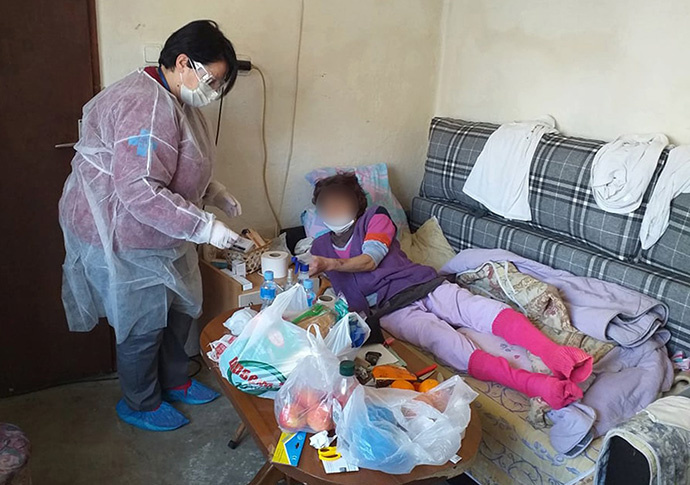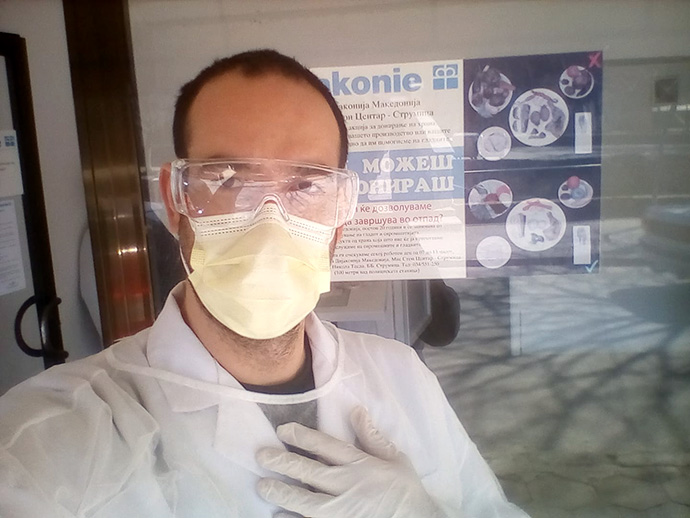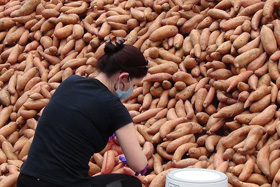
Social distancing restrictions as well as panic buying due to the coronavirus pandemic are causing challenges for a United Methodist-run social center in North Macedonia that operates several feeding programs.
North Macedonia was among the first countries in Europe to confirm a coronavirus infection. The first confirmed case was in Strumica, where the Miss Stone Social Center is located. Named after a U.S. missionary, the center is a diaconal institution — a United Methodist ministry that engages and cares for the needs of its surrounding community.
Martin Konev, project coordinator of diaconal ministries for the United Methodist Church in Macedonia, said the center feeds 220 elderly and disadvantaged people every day, and dwindling resources are threatening its ability to keep feeding that many people.
“We cannot leave them to themselves,” Konev said.
The center had built up a reserve of food, but after only two weeks there was nothing left. Restocking is difficult because some products are already out of stock and others that are still available have skyrocketed in price.
Konev gave one example: Two weeks ago, a package of lemons was 65 Denars (about $1.13 USD). Today they are three times as expensive at 195 Denars (about $3.39 USD).
“This situation has caused us to lose a lot of money and our budgeted expenditure for 2020 will be far from sufficient,” he said.
The center’s Meals on Wheels program has operated every day without interruption for almost 20 years and Konev said he hopes that can continue throughout the crisis. He said the kitchen has always utilized necessary safety measures but additional precautions will be taken to distribute the food. Team members wear gloves, protective goggles, facemasks and disposable coats and carry disinfectant, and the vehicles are disinfected several times a day.
Extra precautions must also be taken at another feeding program in nearby Radoviš. Whereas attendees previously ate in a dining hall, now each one receives a separate pick-up date to avoid crowding, and the food is distributed in front of the building. People receive daily advice on how to protect themselves from the virus and what steps to follow if symptoms appear.
In addition to its feeding programs, the center also runs a school for Roma children in Ohrid, located about 150 miles away in the southwestern part of the country.
When North Macedonia officially closed all schools, universities and kindergartens on March 11, the school for Roma children had to close as well.
Before the closure, the children always received a warm meal at school. The center is still trying to send these families a food package, but limited supplies are making it challenging to do so.

What can’t be replaced during this time is the care and secure environment the school provides to the children, many of whom live in bleak circumstances.
“They call their teacher, Julijana, every day and ask her when school will be back,” Konev said.
Addressing food insecurity

Konev’s greatest concern is for the center’s home-care ministry, which cares for shut-ins who are most vulnerable during this crisis, being unable to leave their home to shop for necessities or go to the doctor. In many cases, visitors from Miss Stone are the only people who come to them, which means they also represent the only possible exposure to the virus.
For now, they are continuing their visits with increased precautions. Team members only visit in full protective gear.
“We thought about pausing until this crisis is over, but we decided to continue despite the danger, because most of the old, helpless people would die alone and helpless even without the virus,” he said.
Many of the people they visit have special dietary needs due to illness, and the center is struggling to obtain certain foods. So far, they have been able to procure necessary medication, but aren’t sure how long that will be possible.
In order to maintain the services for the people who depend on them, the center urgently needs financial support to purchase food and protective items like disinfectant, facemasks and gloves. The center does receive support through The Advance — North Macedonia In Mission Together #00220A.
“We expect even bigger problems and challenges for all projects in the near future, which will not be made any easier by the necessary restrictions of public life imposed by the state,” Konev said, “but we would like to continue to serve these people and continue to do so as long as possible.”
This story was provided by the Central and Southern Europe Central Conference of The United Methodist Church. Contact UM News at 615-742-5470 or [email protected]. To read more United Methodist news, subscribe to the free daily or weekly digests.
Like what you're reading? Support the ministry of UM News! Your support ensures the latest denominational news, dynamic stories and informative articles will continue to connect our global community. Make a tax-deductible donation at ResourceUMC.org/GiveUMCom.



